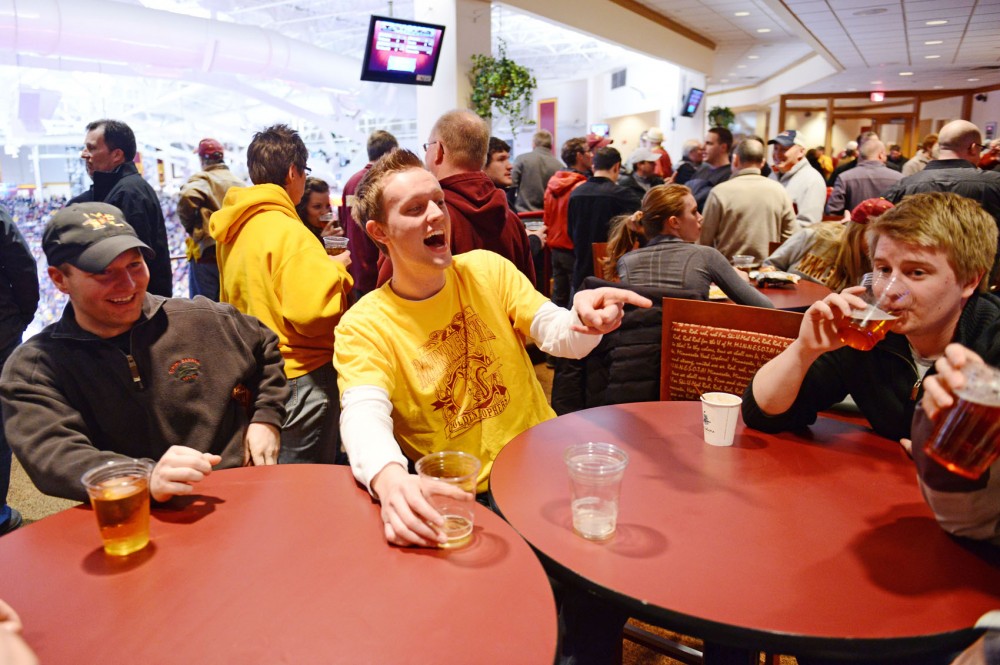The University of Minnesota doesn’t want to expand alcohol sales at Mariucci and Williams Arenas — yet.
University officials testified Tuesday at a hearing on a bill that would allow alcohol to be sold to the general public in the two arenas. A spokesman said the University isn’t ready to expand sales like they have in TCF Bank Stadium.
“The University is not opposed to the bill but has concerns with its implementation this year,” said Todd Iverson, assistant director of University Government and Community Relations.
Premium ticketholders can already purchase alcohol at the arenas, where the University hosts hockey and basketball games.
“Let’s just call it what it is and make sure people can have fair access to it,” said bill author Rep. Dan Schoen, DFL-St. Paul Park. “Maybe they won’t try to binge drink ahead of time …”
Rep. Joe Atkins, DFL-Inver Grove Heights, chair of the Commerce and Consumer Protection Finance and Policy Committee, said he supports the bill because of the success from the alcohol services added last year to TCF Bank Stadium.
The alcohol sales grossed about $900,000 this season, but the University’s net profit was only about $16,000, Iverson said.
Pam Wheelock, vice president for University Services, said the University would like to continue testing alcohol sales at TCF Bank Stadium for another season before considering selling alcohol at additional venues on campus, which she said was part of an agreement with legislators.
Iverson said hockey and basketball games are a “different fan experience” than football games, and he pointed to issues of alcohol-related incidents at the University of North Dakota.
Also, there are significant expenses associated with selling alcohol, like increased security and more staff, he said.
If passed by the Legislature, the bill would still need to be approved by the University’s Board of Regents.
Hockey season ticket holder Alison Schlosser said she supports the legislation because it would attract more fans and cut back on binge drinking before games.
“People will always find a way to provide themselves,” she said, “whether it is sold at the events or not.”
She said students might drink less before the games because they “wouldn’t have the mentality of not being able to drink” during the game.
TCF Bank Stadium had fewer incidents than in any of its previous three seasons because fans knew they could drink at the game and thus arrived in a better state, University police Lt. Erik Swanson previously told the Minnesota Daily.
He said the University administration had concerns about selling alcohol at TCF, but in the end there wasn’t a negative impact.
In addition to preventing students from drinking beforehand, Schoen said the latest bill would increase revenue.
“There are people that deliver the beer, people that make the beer and then there is people that serve the beer as their jobs,” Schoen said. “Those things are important.”
Schoen said alcohol sales at TCF brought in about $80,000 in state revenue last fall.
“This isn’t going to fix the state’s budget hole, but it’s still tax revenue,” he said.
Schoen said he’s going to talk with University officials in the coming weeks about the specifics of his proposal.
“Beer for all worked well at [TCF Bank Stadium],” he said. “Beer for all would work better at the other stadiums as well.”
Iverson said the University wants to talk to the surrounding communities and to alcohol vendors before making any decisions.
He said the University is open to coming back and talking about it, but it just needs “more time to think about it.”
The House Commerce and Consumer Protection Finance and Policy Committee didn’t vote on the proposal Tuesday but discussed nearly a dozen other changes to Minnesota’s liquor laws that could be combined into one liquor omnibus bill.








